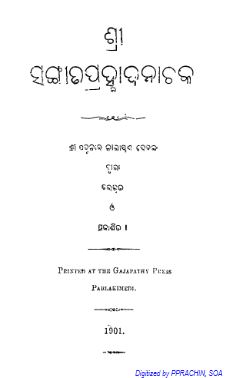In the realm of Odia literature and performing arts, few works have left as indelible a mark as “Sri Sangit Prahalad Natak” by the esteemed playwright Padmanabh Narayan Deb. Published in 1901, this play not only enriches the Odia theatre landscape but also encapsulates the cultural and spiritual ethos of the region.
Sri Sangit Prahalad Natak is a musical drama that draws inspiration from the traditional tale of Prahlada, a fervent devotee of Lord Vishnu. The play centers around the age-old conflict between devotion and tyranny, exemplified through the relationship between Prahlada and his father, Hiranyakashipu, who embodies the demonic forces opposing the divine. The story unfolds as Prahlada’s unwavering faith in Vishnu protects him from his father’s wrath, illustrating the triumph of good over evil.
What sets Deb’s rendition apart is its unique presentation that merges theatrical performance with music, enhancing the emotional and spiritual depth of the narrative. The play’s musical components, from vocal performances to instrumental accompaniments, create a rich tapestry that resonates with audiences, making it a compelling experience beyond mere dialogue.
Published during a period when Odia culture was awakening to a resurgence of pride and identity, “Sri Sangit Prahalad Natak” played a crucial role in this renaissance. Padmanabh Narayan Deb, through his work, not only entertained audiences but also instilled a sense of cultural belonging and spiritual awareness. The themes of devotion, sacrifice, and the perennial struggle against oppression are timeless, echoing the sentiments of the people and their collective history.
Furthermore, the play reflects the socio-political context of the early 20th century. At a time when Odisha, like many regions in India, was grappling with colonialism and internal strife, the emphasis on valor, resilience, and faith serves as a poignant reminder of the strength inherent in unity and devotion. Deb’s portrayal of Prahlada as an emblem of faith against tyrannical forces resonates powerfully, offering a message of hope that transcends time.
The influence of “Sri Sangit Prahalad Natak” in the Odia theatrical scene cannot be overstated. It paved the way for future interpretations of classical themes in Odia theatre, encouraging a generation of playwrights and performers to explore the confluence of traditional narratives with contemporary socio-cultural issues. This play is a testament to the potential of theatre as a vehicle for societal reflection and change.
Moreover, Deb’s integration of music into the narrative structure encourages a dialogue about the importance of multi-disciplinary approaches in performing arts. By blending storytelling with song, Deb not only engaged audiences but also fostered a rich tradition of musical theatre within the Odia cultural milieu.
Sri Sangit Prahalad Natak remains a landmark achievement in Odia literature and theatre. Padmanabh Narayan Deb’s masterful storytelling, combined with his ability to evoke deep emotions through music, crafts an experience that is both enlightening and entertaining. This play stands as a joyful celebration of Odia heritage, inviting future generations to explore the depths of their cultural roots while nurturing a spirit of resilience and devotion. As we reflect on this significant work, we are reminded of the power of art to inspire and unite in the face of adversity.
Books Info
| Books name | Sri Sangit Prahalad Natak |
| Author | Padmanabh Narayan Deb |
| No Of pages | 19 |
| Publisher | NA |
| Publication | 1901 |
| Printed At | Magnem Printers |
| Distributor | NA |

